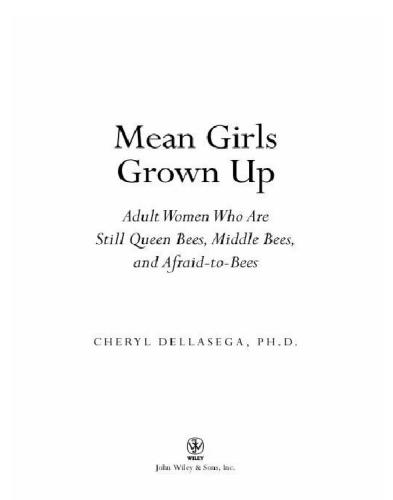
Mean Girls Grown Up
Adult Women Who Are Still Queen Bees, Middle Bees, and Afraid-to-Bees
کتاب های مرتبط
- اطلاعات
- نقد و بررسی
- دیدگاه کاربران
نقد و بررسی

July 18, 2005
Dellasega expands on her previous study of relationship aggression in adolescent females (Girl Wars
) in this exploration of how such toxic behavior may continue on into adulthood. Addressed primarily to victims (Afraid to Bees) of aggression by other women in the workplace, family, church, school and even in feminist organizations, the author also advises the aggressors (Queen Bees) and those who enable them (Middle Bees). Many dramatic anecdotes describe harrowing wounds inflicted by aggressive female supervisors; devious behavior by competitive colleagues; and mothers-in-law who criticize and belittle their sons' wives. Dellasega provides strategies for dealing with bullies and cautions Middle Bees that their role will bring them guilt and anxiety. Queen Bees, she warns, will lose self-esteem and all possibility of satisfying connections with women. To overcome all three self-defeating patterns, the author recommends positive confrontation, working on self-awareness and reaching out to other women for more satisfying relationships. But Dellasega's simplistic categorizing of women into three classes and her assumption that all forms of relationship aggression fit into the same mold help make this a minor addition to the literature on female aggression.

October 1, 2005
Dellasega (humanities, Pennsylvania State Univ.; "Girl Wars") continues her studies of female relational aggression or bullying, this time examining its presence among adult women, which she divides into three groups: queen bees (aggressors), middle bees (enablers), and afraid-to-bees (victims). Drawing on her own research (bibliographical references are included), she relates this bullying to that seen in teenagers and examines its expression in grown women. Afraid-to-bees are the author's main audience, but queen bees and middle bees will no doubt see themselves in the examples of back stabbing, manipulation, harassment, and exclusion. Dellasega devotes the book's last third to self-help techniques for recognizing and changing this relational aggression, including "positive" confrontation and increased self-awareness. While these make sense, the author's categories may strike some as too neat. For larger public libraries. -Kay Brodie, Chesapeake Coll., Wye Mills, MD
Copyright 2005 Library Journal, LLC Used with permission.

























دیدگاه کاربران